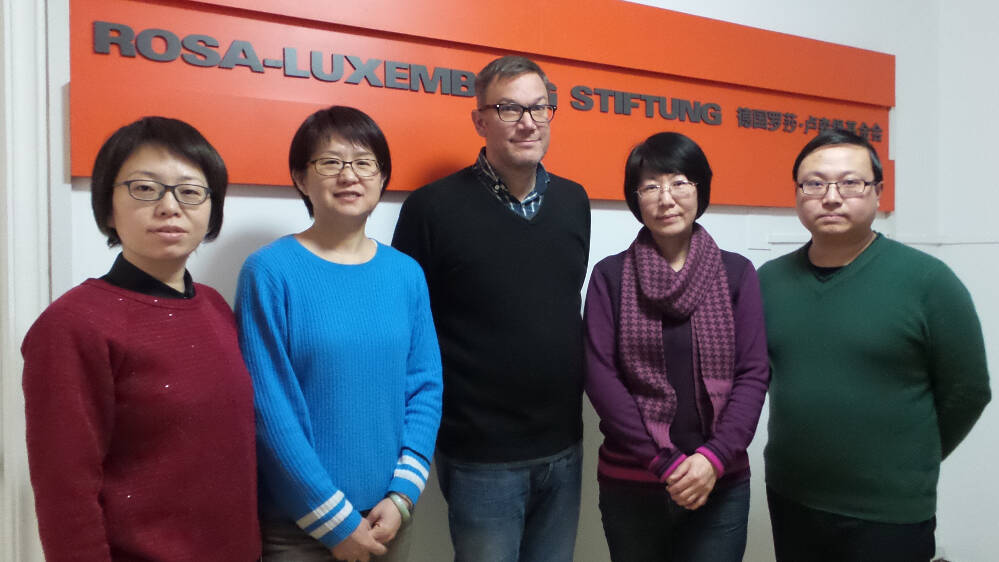China Regional Office
Our regional office in Beijing coordinates collaborations between the Rosa Luxemburg Foundation and its partner organizations in the People’s Republic of China
(Kopie 1)
In the four decades since adopting its open-door policy in 1978, China has undergone a historically unprecedented process of economic and social modernization. According to the Communist Party of China (CPC), the country realized its aim of becoming “a moderately prosperous society” in 2020 and is now moving on to achieve socialist modernization by 2035.
The model of economic growth that has supported these changes so far and lifted more than 600 million people out of poverty is clearly beginning to reach its limits, and must be adapted to the challenges now emerging in a new phase of the country’s development. China is searching for concepts and feasible policies that will help to overcome regional and economic inequalities and non-simultaneities which are slowing development in individual regions across the country.
This path will have to take into account the disparities between urban and rural areas and help the country pursue a resource-friendly and energy-efficient path towards further development. The fight against environmental pollution will become increasingly important. One of the major challenges will be to look beyond purely “technology-based solutions” and embrace options that couple developmental and environmental issues with social justice and encourage citizens to actively participate in shaping their society.
With its growing economic influence, China has now reached a stage where it feels able to take on greater international responsibility. It offers its own model of development up to other states (and emerging countries in particular) as a path to a brighter future. In order to make the “Chinese dream” a reality, the country requires a peaceful political environment and a stable international order, as well as a new cooperative and sustainable security concept.
Activities
- Socio-Ecological Transformation
Given the various transformational challenges currently facing the country, the Chinese government, the Communist Party of China, and Chinese society as a whole will have to search for new paths towards further development. Yet there are no ready-made solutions to help the country move forward — development is a continuous learning process.
One of the prerequisites to solving these challenges therefore lies in becoming politically aware of the fact that the nexus of issues and questions regarding transformation has shifted, and that this awareness can help define new targets, new self-conceptions, and new practices. Moreover, time is running out to ensure a successful transformation of the current development model, particularly if the aim is to avoid irreversible damage to society, humanity, and the environment.
Discussing possible alternative development paths and promoting joint research projects involving Chinese partners are essential aspects of the Rosa Luxemburg Foundation’s work in China. In this way, the foundation aims to foster a discourse together with political actors that integrates various transformational challenges at an empirical and analytical level, reconstruct and critically develop existing concepts, and deploy an integrated approach to rethink and reshape society’s relationship with nature and social relations in general. Based on such a shift in awareness, academics and political decision makers can then search for solutions that will pave the way for socio-ecological transformation at the local, national, and regional level. -
Dialogue for a Just and Peaceful World
Given current domestic and international tensions which are all too easily exacerbated by an unwillingness to communicate or compromise, it is absolutely crucial to maintain all open channels for dialogue and exchange.
As the Rosa Luxemburg Foundation shares a wide range of interests with a number of Chinese institutions and actors (in terms of both research and politics), it has the potential to become an important partner for, not least, dialogue on international development. Together with partners from Chinese universities, research institutions, and policy think tanks, we develop opportunities to assess past developments and discuss fresh political theories related to democratic socialism with the aim of making international relations more just and peaceful.

China Office
Director: Professor Jan Turowski
The Rosa Luxemburg Stiftung
No. 1 Gongti Beilu, Sanlitun Diplomatic Compound 3-2-12
Chaoyang District
Beijing 100600
PR China
Tel.: +86 10 8532 4675 I Fax: +86 10 8532 4675